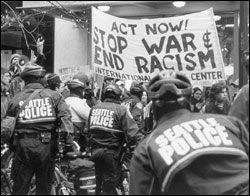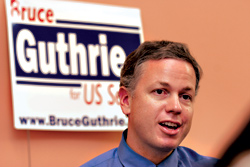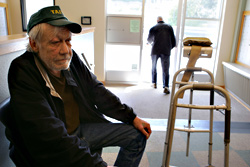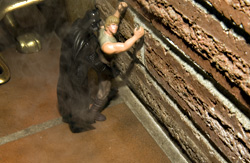A 2002 audit report confirms that Seattle police in recent years have been authorized to infiltrate political, religious, or community groups they suspected were committing or planning unlawful activity. Activists who organized the 2001 commemoration of the World Trade Organization protests think their activities were a target, though the evidence is circumstantial. Whether the infiltration actually occurred or if such police activity is ongoing isn’t known outside city government. Police, including the chief, are mostly silent on the matter. But a report by an outside auditor who monitors police intelligence gathering wrote that an “infiltrator” was properly authorized on Nov. 29, 2001. And if police followed the Seattle ordinance that allows intelligence gathering only under certain circumstances, Chief Gil Kerlikowske would have had to be the one to authorize the operation. The next day was “N30,” the anniversary of the massive anti-WTO protests of 1999. The political activists who organized the commemoration were a loosely knit confederacy of causes. They didn’t look into the backgrounds of those who showed up at meetings. So aside from the coincidence of the date and a brief description of the activity justifying police surveillance, the activists have mostly questions.
WHOEVER THE TARGET WAS, civil-rights attorneys who have reviewed the audit report say officers might have had shaky evidence upon which to base an infiltration violating the spirit, if not the letter, of the ordinance designed to keep police from keeping tabs on political and religious organizing. The three-page audit is an obscure public document that summarizes police intelligence activity since a previous audit in 2001. The 2002 report only recently came to the attention of the N30 activists, and they and others say it raises questions about just how far police are going to prevent potential crimes. Says John Strait, an associate professor of law at Seattle University: “I don’t like the infiltration of political organizations. There’s a long history of government abuse.”
In the Nov. 29, 2001, authorization, police got the go-ahead for an “infiltrator,” likely an undercover detective, to be placed in a group “suspected of malicious mischief, assault, and failure to obtain proper permits,” according to the audit report. The intelligence ordinance defines an infiltrator as “a person acting under the direction of the Department who is a member or associateor poses or acts as a member or associateof a political or religious organization, an organization formed for the protection or advancement of civil rights or civil liberties, or an organization formed for community purposes, and who agrees to provide or provides information about the organization to the Department on a continuing basis without disclosing his or her relationship to the Department.” The audit report outlines nine authorizations or renewals to collect so-called “restricted information” that falls under the intelligence ordinance.
THE AUDIT REPORT does not name who was to be infiltrated in November 2001, but the suspicions used to justify the infiltration were consonant with the nature of arrests at the protests. Jim Goettler, a longtime local activist, says he has no doubt that the SPD targeted the N30 group. Regarding the reference to a failure to obtain permits, Goettler notes that he and others were in federal court Nov. 29, 2001, asking a judge to overrule the city’s denial of a permit for the protest the next day. The judge ordered the city to issue a permit, which the activists had spent months trying to get.
Repeated requests by Seattle Weekly to interview Kerlikowske went unanswered. In an interview, Lt. Ron Leavell, who heads SPD’s intelligence unit, refused to discuss specifics of this or any other case, saying police don’t discuss intelligence gathering, even for old cases. Under the intelligence ordinance, anyone of Leavell’s rank or higher can authorize an infiltration or other police intelligence activity, but it takes the chief to OK a renewal of an authorization. The Nov. 29, 2001, authorization actually was a renewal of one that had expired nine days earlier. The audit report didn’t give the date of the original authorization.
So did cops actually spy on the N30 group? Police won’t say. Activists can’t prove it. But it’s hard to imagine a scenario under which an authorization to infiltrate a group would be handed up several layers of bureaucracy, signed by the chief, and then not acted upon.
UNDER THE INTELLIGENCE ordinance, a civilian auditor, who today is well- respected attorney Jeffrey Robinson, periodically inspects intelligence files provided to him by police. He assesses whether they have met requirements for collecting restricted information. Among them: “That there is a reasonable suspicion that the subject of the restricted information has engaged in, is engaging in, or is about to engage in unlawful activity.” In
the audit report given to the Seattle City Council last December, Robinson asserts that police followed the law.
Not everyone buys that, notwithstanding a widely shared regard for Robinson’s legal judgment and respect for civil liberties. “I just think it way crosses the line,” says Mickey Gendler, a lawyer who heads the American Civil Liberties Union legal committee in Washington state. What’s especially troubling, Gendler says, is that the police based their infiltration on activity such as malicious mischief and failure to obtain permits, which would normally result in misdemeanor charges. That hardly rises to the level of significant criminal activity, he says. It’s more along the lines of charges for expired license-plate tags. To him, there is the odor of potentially trumped-up charges.
SPD’S LEAVELL DECLINED to discuss what evidence police had of criminal activity by the group. Previous WTO protests resulted in property damage downtown, physical clashes with police, and numerous arrestsalthough there is a dearth of evidence to suggest that organizers, as opposed to renegade participants, planned such action. In any event, it’s understandable police would be suspicious of the group’s intentions. All the same, the ACLU of Washington says, that isn’t justification for an infiltrator. “We don’t think an infiltrator should be placed in political groups because of minor property crimes,” says Doug Honig, an ACLU spokesperson. “It certainly violates the spirit of the ordinance, if that’s what happened.”
Honig says that using past events to justify infiltrating a political group is wrong, especially when the group espouses nonviolent protest and when trouble comes from participants who weren’t involved in planning the event. Says Lisa Daugaard, an attorney with the Defender Association: “Even if police had legitimate concerns about a few individuals’ intentions, it is chilling to use that as a pretext to secretly monitor political or community groups they belong to.”
SEATTLE POLICE HAVE a history of infiltrating activist groups. Until the late-1970s, SPD maintained files on political activists of every stripe, as well as journalists. A group known as the Coalition on Government Spying got access to police files and issued a scathing report, which led to the passage of the intelligence ordinance in 1979. And in 1999, police were caught surreptitiously videotaping a meeting of groups organizing to tackle alleged police abuse. Then-Chief Norm Stamper ordered that the tapes be destroyed.
The future of the intelligence ordinance is in some doubt. Last year, Kerlikowske told The Seattle Times, “In this day and age, in the post-9/11 world, this is an ordinance whose time has passed.” Marianne Bichsel, spokesperson for Mayor Greg Nickels, says the ordinance is under study by city staffers; a decision on possible changes could come by year-end.
It’s unclear if more will be learned about the 2001 spyingif it happened. Goettler is frustrated enough to want to take legal action, but he and other activists aren’t in a position to finance an extended court challenge.
WITH KERLIKOWSKE apparently declining a chance to explain why police would need to infiltrate a group likely to be political activists, previous remarks are noteworthy. At a law-enforcement conference in Spokane in May, Kerlikowske said in a speech: “People look for leadership and comfort in their police chiefs and people in charge. We are the ones who have to explain security measures to a skeptical and fearful public.” A number of people await just such an explanation.








